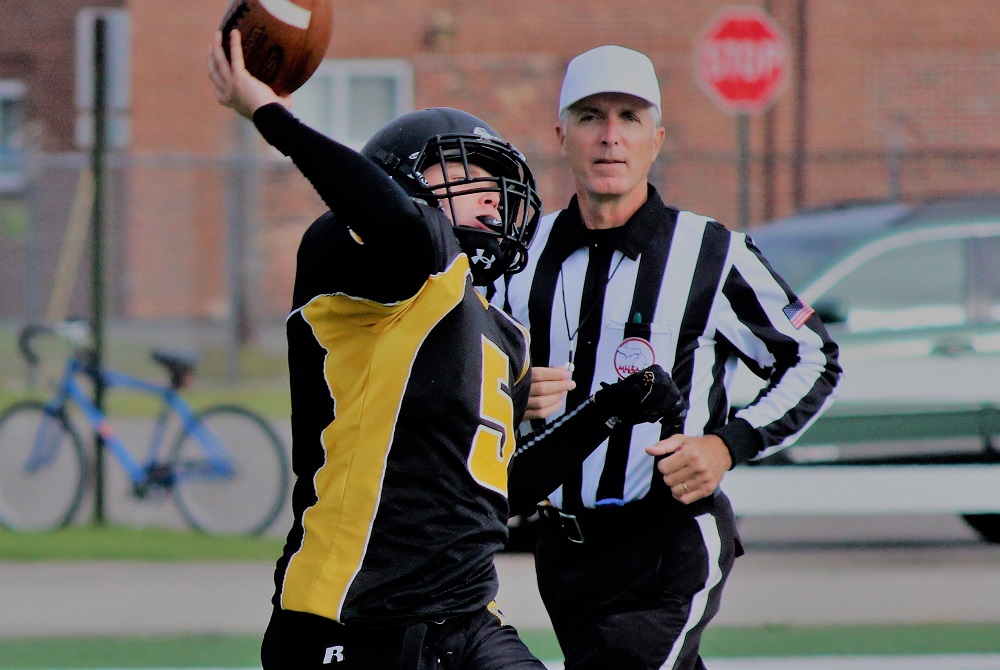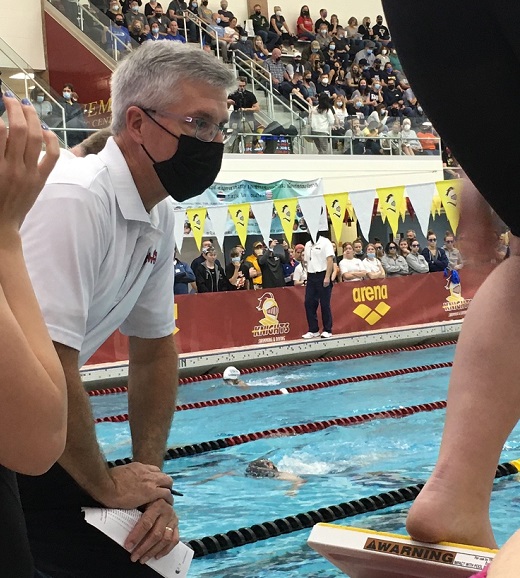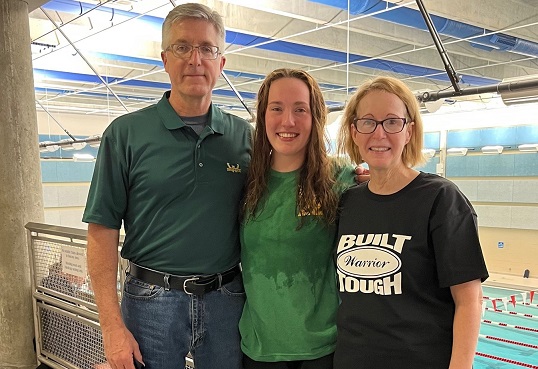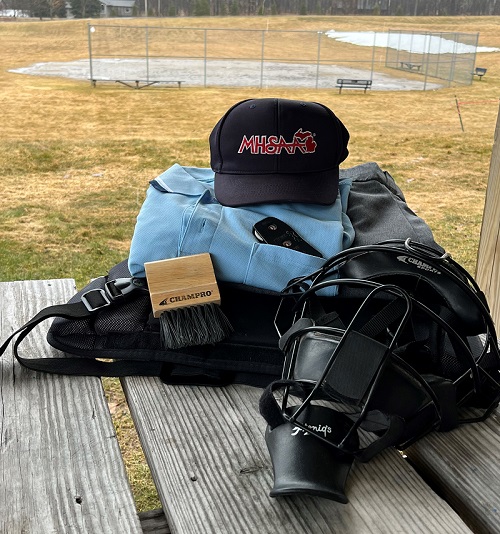
Officials Eager for New Hockey Format
July 12, 2019
By Rob Kaminski
MHSAA benchmarks editor
Tuesday, Feb. 26, was a particularly busy day on the ice as the 2019 MHSAA Ice Hockey Tournament reached just its second day around the state.
On the slate that night were 27 Regional games, bringing the two-day total to 48 on the heels of Monday’s busy calendar.
As teams were busy setting their sights on the ultimate goal, so, too, was another group of accomplished skaters who toil with much less fanfare. Nonetheless, the games can’t start without them – the folks in the striped shirts who call the games.
Just as players and coaches will welcome the expanded playoff format in 2020, the officials are looking forward to the change as well.
“When we got to the first week of the tournament, it seemed like we were going every day,” said Jim Gagleard, who assigns officials for the Livonia Ice Hockey Officials Association. “There are only so many officials to go around in any sport. By allowing us as officials a day or two to catch our breath, it’s good. Good for us, and good for players more than anything.”
If it seemed like every day, well, it was. A total of 66 games were played over the first three days, and 89 over the first four. Considering each game at the Regional level has three officials, that computes to 267 officials needed during that span. On the busiest day, 81 had to take to the ice.
Given that there were a total of 302 playoff-eligible officials in 2019, filling those slots can be a logistical nightmare for assigners at times.
“Regional week will see a huge burden alleviated for officials and especially assigners. There will be so much more flexibility under the new format,” said Dan DiCristofaro, President of the Northeast Hockey Referees Association. “Last year, we were faced with so many doubleheaders at single sites, and the first games needed an early start so that the second games would not last late into the evening on school nights.
“At times, the most important factor for the assigner was scheduling those officials who could get to the arena for the early start times. Merit and ability sometimes had to take a back seat.”
Gagleard agrees, saying, “Assigning-wise, early games are the toughest to fill. Everyone has a job, and in order to work a game they have to tell the boss they’re leaving at 2:30 for a 5 o’clock game. You start to look for officials who are retired, or can get out of work, instead of the most qualified. That’s not fair to the teams playing.”
In the northern reaches of the Upper Peninsula, the problem is more acute.
Sean Jacques is the athletic director at Calumet, and also an experienced official, having skated the Division 2 Final in Plymouth in 2016.
“Not enough,” Jacques said, in reference to the number of playoff officials in the UP. “Not enough. When I get the list of eligible officials that is sent to tournament managers, I have to search and scramble to find three people within an 80-mile radius.”
Moving the Quarterfinals to the weekend will definitely help matters, and eliminating Regional doubleheaders should ease the scheduling anxiety as well.
 “With Regionals spread out more, without doubleheaders, officials potentially could work more days,” Jacques said. “And there should be more availability for the Quarterfinals. The last few years, it was in the Sault, and getting four guys to the Sault on a weeknight, whether from Escanaba or northern lower Michigan, was difficult. There were times I’d turn down a Quarterfinal because I just couldn’t get there and back and make it to work the next day. Saturday makes it easier.”
“With Regionals spread out more, without doubleheaders, officials potentially could work more days,” Jacques said. “And there should be more availability for the Quarterfinals. The last few years, it was in the Sault, and getting four guys to the Sault on a weeknight, whether from Escanaba or northern lower Michigan, was difficult. There were times I’d turn down a Quarterfinal because I just couldn’t get there and back and make it to work the next day. Saturday makes it easier.”
On the west side of the Lower Peninsula, assigner Randy Sheahan uses a mathematical approach to illustrate his challenges, even for the regular season. Sheahan calculates that 98.88 percent of all West Michigan games are scheduled for Wednesday, Friday, or Saturday. Breaking it down further, 84.39 percent skip Wednesday and schedule only Friday or Saturday.
With the shortened regular season coming in 2019-20 to allow for a three-week tournament window, Sheahan took a proactive approach.
“When the MHSAA announced the change to a three-week tournament, I emailed all West Michigan coaches, plus a handful of athletic directors and booster leaders who may be involved in team scheduling,” Sheahan said. “I encouraged them if they are having difficulty squeezing all their games into a window which is now one week shorter, to give further consideration to playing on Mondays, Tuesdays, or Thursdays to greatly alleviate some of the stresses we place on the West Michigan officiating staff.”
As for the MHSAA Tournament, Sheahan agrees with his brethren across the state in metro Detroit that the expansion will benefit assigners, officials, and teams.
“I only see positives,” Sheahan said. “This gives me tremendous flexibility with our staff to maneuver around their professional and personal schedules to keep our best officials on the ice every round, which is an expectation teams have for playoffs. It also provides (at times) much needed rest for officials and teams, especially if they are involved in overtime affairs. This could help with the quality of overall game play.”
That’s the goal for everyone. Fresher legs for players and officials alike will provide a better experience for all involved.
“This allows for physical recovery for everyone on the ice,” said DiCristofaro. “It also allows for better time management for student-athletes, officials and coaches. Even at the Quarterfinal offerings with four officials for each game, we’d run into issues as far as which people could get to places, or wanted to travel and skate late on a work night. Saturday give us much more flexibility and should create more interest in the state tournament.”
The Quarterfinals, Semifinals and Finals have employed a four-official system in recent years, affording an extra position each game for deserving officials while adding to the quality of the game for participants at the highest level.
Sheahan plans to utilize the new format to continue to reward those among his troops who have earned their stripes for such contests.
“In theory, I may have opportunities to increase game counts for some of our perennial playoff officials, but I have no plans to do that,” Sheahan said. “We have other officials every season who are good enough to skate playoffs and have earned it, but simply couldn’t quite break the playoff bubble. Now the opportunity presents itself to reward some of those officials. It would be counterproductive to officiating development if fewer officials are getting opportunities for important games.”
Similarly, DiCristofaro is hoping the time will come when four officials will be assigned to skate Regional Finals, and perhaps the new length of the postseason will open the door.
“Some of most important games are the Regional Finals. Maybe this new schedule can help,” DiCristofaro said. “Four officials offer teams the best possible ice coverage, and they deserve that.”

Official's List of 'Favorite' Sports Grows with Dedication to Making Our Games Go
By
Tom Spencer
Special for MHSAA.com
April 8, 2022
Any season. Any MHSAA sport.
 Well, almost any.
Well, almost any.
You name it, and likely Jeff Brunner has officiated it. He may even have been selected to officiate an MHSAA Final in the sport as well.
He first started as a baseball umpire right out of high school. Family and work life created a 20-year absence from officiating for the 1979 grad of Romeo High, where he had played baseball for the Bulldogs.
Brunner, a 20-year MHSAA registered official, is about to work his favorite sport – softball – again. But, the 60-year-old readily admits he loves games so much, the favorite sport can change regularly for him.
“It’s kind of whatever is in season,” Brunner said of naming a favorite. “I love the pace of the game of softball, and I am a big proponent of providing as may opportunities for girls to play sports, whatever that sport may be.
“For that reason I gravitated towards softball.”
He’ll have to wait though to get on the field. Both of his games were cancelled this week due to weather-related complications.
 “Weather can create havoc with spring sports schedules – more so than any other season – so from an officiating standpoint, you have to count on some games being postponed or cancelled,” he acknowledged. “You just have to go with the flow and be ready to work when the weather allows.
“Weather can create havoc with spring sports schedules – more so than any other season – so from an officiating standpoint, you have to count on some games being postponed or cancelled,” he acknowledged. “You just have to go with the flow and be ready to work when the weather allows.
“I feel a bit bad for softball and baseball players in particular, because those seasons are so short to begin with, and every contest date is important,” he went on. “When bad weather causes cancellations as a result of rain or the extension of winter, it makes the high school season that much shorter for the athletes.”
Brunner, a father of four grown children, is currently registered for softball, football, volleyball, swimming & diving and basketball. He once did lacrosse in addition to starting his officiating career with baseball.
“There is only so much time in the week,” he said. “I can’t do everything.
“I have at least one sport for each of the three sporting seasons,” he continued. “It’s fun.”
Brunner watched his three daughters grow up playing softball and competing in swimming. His son played baseball and competed in swimming. They all graduated from Traverse City St. Francis, swimming through a co-op program. His daughters were all pitchers for the Gladiators. Their first pitching coach was Dad.
His youngest daughter, Julia, just finished competing for Wayne State University at the 2022 Division II Women’s Swimming & Diving Championships in Greensboro, N.C.
It was his kids that got him into officiating, along with the extra money. But today, it’s just to be a part of a game.
“We were always around sports,” Brunner said. “I thought about officiating for a while.
“Originally I did it to maybe earn just a little bit of extra money, get a little bit of exercise, and kind of stay close to the game,” he continued. “Now, it is just plain fun — it’s fun to be around a game, whatever that game is.”
During his officiating career, Brunner has been selected to officiate MHSAA Finals in swimming & diving and football. He’s not likely to get the chance to umpire a baseball or softball Final as his other business obligations interfere with MHSAA spring postseason play.
 While working a Final is a goal of most all MHSAA officials, Brunner said it is just another game once it starts. He sees the Final as a great experience for all coaches, participants, fans and officials.
While working a Final is a goal of most all MHSAA officials, Brunner said it is just another game once it starts. He sees the Final as a great experience for all coaches, participants, fans and officials.
“MHSAA always does a great job of putting on a Final,” he said. “It’s always special.
“You have a few butterflies prior the game or the meet, but once things start you started focusing on the game itself.
The longer Brunner officiate, whatever the sport is, he believes the key to making the right call often comes down to mechanics.
“Mechanics were drilled into me when I first started,” Brunner said. “A lot of making the right call in my opinion is having the right mechanics and knowing where to be.
“You need to be in a good position to make the call.”
Many veteran coaches have noticed Brunner prides himself on being in the right position, and more. It is noted game after game, season after season.
“Jeff Brunner is the consummate professional as an umpire,” said Dave Kennedy, Traverse City West’s varsity softball coach. “He is excellent with his calls and positioning, but he is most concerned about getting the call right.
“Every time I see I have Jeff as part of the umpiring crew for my games, I know the game is going to be very well officiated,” Kennedy continued. “We are lucky to have Jeff as one of our officials in Northern Michigan — he’s definitely one of the best.”
 "As an umpire, Jeff's professionalism and easy demeanor are much appreciated,” Hawkins said. “He runs the games he works in such a way that the focus stays on the players.
"As an umpire, Jeff's professionalism and easy demeanor are much appreciated,” Hawkins said. “He runs the games he works in such a way that the focus stays on the players.
“Jeff may not know every player on the field personally, but I'm convinced that Jeff takes on his job, which is a difficult one, for them – the players."
Brunner and his son Andrew’s high school baseball experiences made it easy for Jeff to jump into baseball — and the same was true for softball due to his pitching girls. Swimming & diving, though, has been perhaps the most challenging sport to learn how to officiate for Brunner.
Watching his four children compete in pools over the years was a big help. The physical aspect was much easier, but maybe not the rules.
“The hard part is knowing all the rules … knowing what is a legal stroke and what is not,” he said. “It was an easy transition — we had seen so many swim meets.”
Today Brunner is anxiously waiting to get back on the softball field. He’s got his gear ready in anticipation of calling his first pitch of the 2022 season.
 Tom Spencer is a longtime MHSAA-registered basketball and soccer official, and former softball and baseball official, and he also has coached in the northern Lower Peninsula area. He previously has written for the Saginaw News, Bay County Sports Page and Midland Daily News. He can be reached at [email protected] with story ideas for Manistee, Wexford, Missaukee, Roscommon, Ogemaw, Iosco, Alcona, Oscoda, Crawford, Kalkaska, Grand Traverse, Benzie, Leelanau, Antrim, Otsego, Montmorency, Alpena, Presque Isle, Cheboygan, Charlevoix and Emmet counties.
Tom Spencer is a longtime MHSAA-registered basketball and soccer official, and former softball and baseball official, and he also has coached in the northern Lower Peninsula area. He previously has written for the Saginaw News, Bay County Sports Page and Midland Daily News. He can be reached at [email protected] with story ideas for Manistee, Wexford, Missaukee, Roscommon, Ogemaw, Iosco, Alcona, Oscoda, Crawford, Kalkaska, Grand Traverse, Benzie, Leelanau, Antrim, Otsego, Montmorency, Alpena, Presque Isle, Cheboygan, Charlevoix and Emmet counties.
PHOTOS (Top) Official Jeff Brunner has his eyes on the action while officiating a football game. (2) Brunner monitors a starting block during November’s MHSAA Lower Peninsula Division 3 Swimming & Diving Finals at Calvin University. (3) Brunner and his wife Michelle support daughter Julie at March’s Great Lakes Interscholastic Athletic Conference championship meet. (4) Brunner’s gear sits ready for his first game this week before it was canceled due to bad weather. (Photos courtesy of the Brunner family.)

